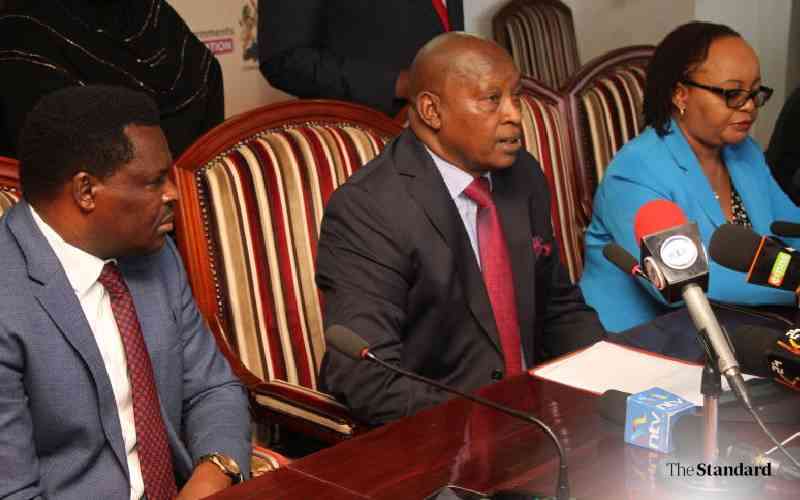Enact staff CBAs, repeal unfriendly laws to tackle mess in our varsities
Columnists
By
Koki Muli Grignon
| Sep 22, 2024

The Commission of University Education lists 35 public universities, 2 specialised degree awarding public universities and 6 constituent colleges of public universities as at June 2024.
Three unions cater for the welfare of different categories of staff in public universities; Universities Academic Staff Union (UASU) catering for teaching staff, the Kenya Universities Staff Union (KUSU) for non-teaching staff from grades 5-15 and the Kenya Union of Domestic, Hotels, Educational Institutions, Hospitals and Allied Workers (KUDHEIHA) caters for non-teaching staff in grades 1-4.
The national offices (UASU, KUSU) issued a strike notice on September 11 to commence on September 18 in all public universities to resolve disputes and grievances, adversely and negatively affecting university staff without resolution from government since 2017.
Key grievances include non-implementation of the 2017-2021 CBA in many universities, non-implementation of annual salary increments, (staff earn the same money almost 10 years ago), the failure to negotiate the 2021-25 Collective Bargaining Agreement (CBA), delayed and non-remittances to third parties, to banks to pay staff/lecturers' loans, staff/lecturers' contributions to SACCOs and to pension plans for lecturers/staff, yet universities deduct these contributions monthly.
In fact, some local SACCOs are on the verge of collapse, completely unable to meet their statutory financial obligations. Other local chapters issues include grievances over commuter allowances, work-load for lecturers, discrimination in hardship allowances, unfair or discriminatory medical cover, where most staff lack functional medical insurance.
READ MORE
Governors demand higher allocations in Division of Revenue Bill 2025
Mastering personal finance in Kenya's low-interest rate era
How Kenya is losing illicit brews trade war at the borders
Internal auditors challenged to embrace strategic advisor role
US trade deficit hit fresh record before new Trump tariffs
Scrap metal dealers warn of industry collapse over new tax proposal
Value of unclaimed financial assets rose to Sh4.3 trillion in 2024 - Survey
Cargo volume grows at Kisumu port on infrastructure upgrade
Stakeholders seek to make Kenyan tea top brand in the global market
Article 41 of the Constitution, provides that every person has the right to fair labour practices and all workers have the right to fair remuneration; to reasonable working conditions; to form, join or participate in activities and programmes of a trade union; and to go on strike.
The government, universities and unions have been negotiating CBAs, which governed their labour relations in public universities successfully. However, in recent past, their relations have become extremely strained and egregious especially because of budgetary cuts and delayed capitation and disbursement of students funding.
Recent micromanagement of public universities affairs by government and politicisation of appointment of Chancellors, Vice-Chancellors, Deputy Vice Chancellors etc., have worsened the situation. Sadly, some universities are still operating without substantive DVCs since the Public Service Commission shortlisted applicants but has not interviewed for more than a year.
Nevertheless, the main grievances and disputes causing this strike are as a result of inadequate, drastically reduced and delayed university funding and budgets, which have paralysed most public universities' operations. Also, public universities' employees are paid from capitation and students' fees/tuition from government based on their declared students' data and statistics.
CUE, which regulates university education is not a constitutional commission (who slept of the job?), unlike the Teachers Service Commission (TSC) whose employees are paid directly from the consolidated fund. Lack or inadequate funding or budgets for public universities, also greatly undermine their operations and management and universities, by their nature cannot be subject to same austerity measures as government, which will undermine quality of graduates.
Inadequate and delayed funding means insufficient teaching and laboratory staff, insufficient library materials and resources, teaching facilities, aids, equipment, materials/resources and very low morale. In Article 260 of the Constitution, university employees are public officers as their remuneration and benefits are payable directly from money provided by Parliament.
Unions and the government must bring university employees at par with teachers (TSC employees), and pay their remuneration and benefits directly from the consolidated fund as a long-term solution.
Meanwhile, the government must pay university employees same increments of between 7-10 per cent offered to other public servants and government must invest adequately in university education to guarantee future posterity.

